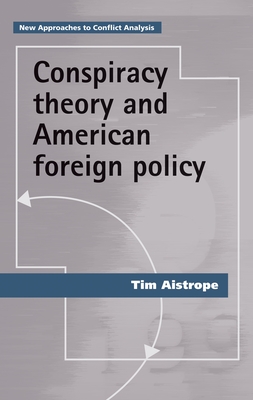This study examines the relationship between secrecy, power and interpretation around international political controversy, where foreign policy orthodoxy comes up hard against alternative interpretations. It does so in the context of American foreign policy during the War on Terror, a conflict that was quintessentially covert and conspiratorial. -- .
Conspiracy theory and American foreign policy examines the relationship between secrecy, power and interpretation around international political controversy, where foreign policy orthodoxy comes up hard against alternative interpretations. It does so in the context of American foreign policy during the War on Terror, a conflict that was quintessentially covert and conspiratorial. This book adds a new dimension to the debate by examining the ''Arab-Muslim paranoia narrative'', the view that Arab-Muslim resentment towards America was motivated to some degree by a paranoid perception of American power in the Middle East. Immediately after 9/11, prominent commentators pointed to an Arab-Muslim culture of blame and a related tendency towards conspiracy theories about America''s regional influence as an important cultural driver of anti-Americanism. This narrative subsequently made its way into numerous US Government policy documents and initiatives advancing a War of Ideas strategy aimed at winning the ''hearts and minds'' of Arab-Muslims. This book provides a novel reading of the processes through which legitimacy and illegitimacy is produced in foreign policy discourses. It will appeal to students and academics interested in International Relations, security studies and American politics, as well as appealing to a wider cross-disciplinary audience interested in the burgeoning issues of conspiracy, paranoia, and popular knowledge, including their relationship to and consequences for contemporary politics.
Get Conspiracy Theory and American Foreign Policy by at the best price and quality guranteed only at Werezi Africa largest book ecommerce store. The book was published by Manchester University Press and it has pages. Enjoy Shopping Best Offers & Deals on books Online from Werezi - Receive at your doorstep - Fast Delivery - Secure mode of Payment
 Jacket, Women
Jacket, Women
 Woolend Jacket
Woolend Jacket
 Western denim
Western denim
 Mini Dresss
Mini Dresss
 Jacket, Women
Jacket, Women
 Woolend Jacket
Woolend Jacket
 Western denim
Western denim
 Mini Dresss
Mini Dresss
 Jacket, Women
Jacket, Women
 Woolend Jacket
Woolend Jacket
 Western denim
Western denim
 Mini Dresss
Mini Dresss
 Jacket, Women
Jacket, Women
 Woolend Jacket
Woolend Jacket
 Western denim
Western denim
 Mini Dresss
Mini Dresss
 Jacket, Women
Jacket, Women
 Woolend Jacket
Woolend Jacket
 Western denim
Western denim
 Mini Dresss
Mini Dresss






























































